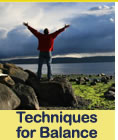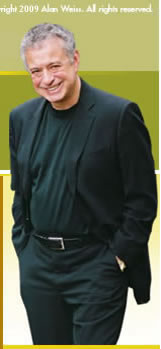    
Balancing Act: The Newsletter (No. 119: July 2009) Follow me on Twitter! You can find me here: New consulting and leadership tips posted daily! And find me on Facebook: 
Techniques for balance

As we look to our futures, there are only two kinds of actions which can help to ensure success. One is preventive, and the other contingent. However, they are not as easy as one may think. When we consider, say, the threat of fire, we tend to make certain that we have insurance; fire extinguishers; an exit plan; and even fireproof doors leading to garages or furnace rooms. But these are all contingent actions. That is, they are triggered only after a fire begins. The preventive actions would include safe storage of combustible materials; ensuring that wiring is compatible with proper codes; clearing brush away from the house; and performing an annual inspection. Yet we pay more attention to contingent actions than preventive actions. We honor our firefighters, as we should, when they race into harm's way to try to save lives and property. But we don't salute the fire marshal, whose actions are actually more effective. (On the industrial side, the lesson has been learned, which is why you see required evidence of elevator inspections, equipment checks, seaworthiness, and so on.) In our own lives, it's helpful to consider preventive actions. Looking for a new job is much harder and more stressful than preventing the loss of the job you now hold. (Yes, I'm aware of politics, RIFs, downsizing and all the rest, but my consulting experience has shown me that companies rarely let go of top talent, no matter what.) It's cheaper to prevent the roof from deteriorating than to replace it. Our car warranties usually require that we pay for preventive maintenance. All diets are really contingent actions, and it's very hard to lose weight and keep it off. Regular exercise trumps bypass surgery. Ironically, people who are highly reactive and opportunistic fall into the trap of being mired in contingent action. They become so good at reacting to developments that they neglect trying to prevent the more odious ones. But most issues in life are usually best dealt with from a preventive mentality than a contingent one. (Years ago, the dental profession stopped focusing on "fixing" bad teeth, since fluoridation and better education were preventing traditional problems, and joined the effort to prevent problems with orthodontia and similar interventions. Now, in an advance on that, a large part of the profession is taking up cosmetic dentistry.) Take a look at your plans for vacation, education, occupation, avocation, and situation. Ask yourself if you've sufficiently considered preventing problems, so that you can sail through without capsizing. Or, are you solely focused on the lifejackets and lifeboats? 
Charity "Charity" is an act of voluntary giving. It may involve money, time, expertise, access, property, or any number of things. People generally agree that acting in a charitable manner is salutary behavior, though the degree and amount are clearly subjective. One of my favorite comments on the subject is by the writer Joseph Epstein: "�the true measure of generosity is not how much one gives but how much, after giving, one has left over." I've seen people become suddenly charitable after good fortune. They win at the craps tables or inherit a sum, and are moved to share generously with others. I've seen people become suddenly charitable after bad fortune. Times are tough, but they realize that others have it still tougher, and they tend to share their meager means with those less fortunate. I've seen people who are charitable for self-serving reasons. While it makes sense that giving of yourself or your resources should be an uplifting experience, I don't have much admiration for those who give solely because their name will be emblazoned on buildings or events. (I've suggested that we rename the State of Rhode Island after one such person here, with the expectation that he would then pay off the debt and end property taxes.) The act of giving is of itself admirable, despite the amount or type. Giving of one's time may be the most estimable form of charity, because while you can always make another dollar you can't ever manufacture another minute. When we were in high school-and a public school at that-we were encouraged to donate our time, and it was impressive to see scholars, athletes, cheerleaders, "geeks," the social and the anti-social, all interacting with community groups that needed help. I've found that it's too easy to overlook being charitable. Oh, there are those reminders, such as the basket that passes along the pews at church every week. You can't miss that. But you can miss church. In a busy world, I think it's important to plan to be charitable, because with the best of intentions, you can forget, or become so inured to the constant phone calls of professional fund raisers that your natural empathy turns into manufactured antipathy. What's your plan to help others, or animals, or causes, or initiatives in these tough times for many? How will you give of yourself and your resources? It might not hurt to mark it on your calendar or record it in that electronic gizmo. And afterwards, I guarantee you'll feel a lot better. 
My wife and I were attending a fund raising event in the quad at Brown University featuring a very well known singer early in his career. We didn't have particularly good seats. As we were waiting for the evening to begin, we noticed a man in a restricted area quite obviously staring at me. My wife had dressed me well, as usual, and we both realized he was giving me an appreciative look and smile. Apparently, he didn't notice I was with someone, or didn't care. As the lights dimmed, a 1950s classic Bentley drove in with the star, who emerged as the car stopped at the outdoor stage, and into the spotlight bounded the man who had been staring at me. "If you had smiled back," whispered my wife, "we might have gotten better seats." 
|

Balancing Act® is our registered trademark. You are encouraged to share the contents with others with appropriate attribution. Please use the ® whenever the phrase "Balancing Act" is used in connection with this newsletter or our workshops. Speaking with AlanAt Alan's home
|
| Having problems viewing this email, click
here. |
|
P.O. Box 1009 � East Greenwich, RI 02818-0964 � Telephone: (401) 884-2778 � Fax: (401) 884-5068
All Rights Reserved. Copyright 2009 Summit Consulting Group








